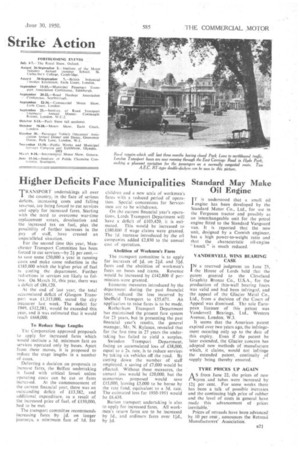Higher Deficits Face Municipalities Standard May Make
Page 39

If you've noticed an error in this article please click here to report it so we can fix it.
• • • •
TRANSPORT undertakings all over
the country, in the face of serious deficits, increasing costs and falling revenue, are being forced to cut services and apply for increased fares. Starting with the need to .overcome war-time replacement arears, devaluation and the increased tax on fuel, plus, the possibility of further increases in the pay of staff, have created an unparalleled situation.
For the second time this year, Manchester Transport Committee has been forced to cut services—by 21 per cent.— to save some £50,000 a year in running costs and make some reduction in the X185.000 which the higher price of fuel is costing the department. Further reductions in services are likely to follow. On March 31, this year, there was a deficit of £86,120.
At the end of last year, the total accumulated deficit of Glasgow Transport was £1,313,000, stated the city treasurer last week. The deficit • for 1949, £312,581, would be exceeded this year, and it was estimated that it would reach £668,000.
To Reduce Stage Lengths
The Corporation approved proposals to apply for increased fares which would institute a 3d. minimum fart on services operated only by buses. Apart from these moves, it is proposed to reduce the stage lengths in a number of cases. .
Deferring a decision on proposals to increase fares, the Belfast undertaking is faced with critical lossei. 'unless operating costs can be cut or tares increased. At the commencement of the current financial year, there was an outstanding deficit of £13.382,and additional expenditure, as a result of the increased price of fuel, of £150,000, had to he met.
The transport committee recommends increasing fares. by 1d. on longer journeys: a minimum fare of ld.' for children and a new scale of workmen's fares with a reduced period of operation. Special concessions for Servicemen are to be withdrawn.
On the current financial year's operations, Leeds Transport Department will have a deficit of £103,420, it is esti mated. This would be increasedto £180.000 if wage claims were granted. The ';d. increase introduced by the oil companies added £2,830 to the annual cost of operation.
Abolition of Workmen's Fares
The transport committee is to apply for increases of id. on 2id. and 31d. fares and the abolition of workmen's fares on buses and trams. Revenue would be increased by £142,800 if permission-were granted.
Economy measures introduced by the department during the past financial year, reduced the loss incurred by Sheffield Transport to £55,671. An application to raise fares is to be made.
Rotherham Transport Department has maintained the present fare system for 23 years, but in presenting the past financial year's results, the general manager, Mr. N. Rylance, revealed that for the first time in 27 years the undertaking has failed to yield a surplus.
Swindon Transport Department, facing an accumulated loss of £38,000, equal to a 2s. rate, is to reduce services by taking six vehicles off the road. By cutting down the number of staff employed, a saving of £7,000 would be effected. Without these measures, the annuli loss would be £20,000, but the economies proposed would save £15,000, leaving £5,000 to be borne by the rate fund, equivalent to a 3d. rate. The estimated loss for 1950-1951 would be £6,438.
Burton transport undertaking is also to apply for increased fares. All workmen's return fares are to be increased by 1d., and ordinary fares over by id.




























































































































